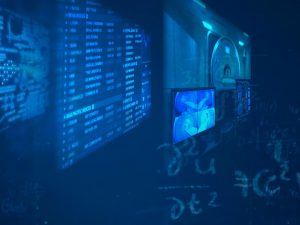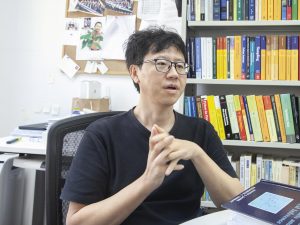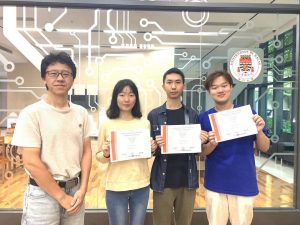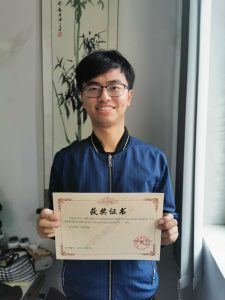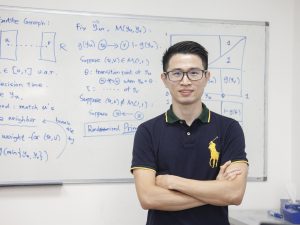Mathematics is the foundation of all scientific studies. From ancient Greece to the present day, people have been using this language of science to explore the laws of nature. Today, mathematical tools are applied in a wide range of disciplines and continue to inspire people to think and explore new frontiers. In this issue of MyUM, several faculty members and students share how they use mathematical knowledge to solve problems in their fields to benefit society.
Mathematical Applications in Precision Medicine
Approaching biomedical science from a mathematical perspective is one of the directions of interdisciplinary studies at the Centre for Applied Mathematics (CAM) of the University of Macau (UM). Cai Xiaochuan, director of the centre, is a scholar in the field of computational mathematics. He is also University of Macau Development Fund Chair Professor of Applied Mathematics and associate dean of the Faculty of Science and Technology. He has spent 20 years using supercomputers to simulate the flow of blood in the human body and the results enable new precision medicine treatments.
In the University of Macau Development Foundation Named Professorship Lecture, Prof Cai presented ‘Mathematical Algorithms and Clinical Tests for Predicting Cardiovascular and Cerebrovascular Health’ to discuss the recent applications of supercomputers and computational biomechanics in precision medicine. Prof Cai contends that studies in hemodynamics allow for the analysis of blood flow-related health problems from a mathematical and physical perspective. For example, based on the decrease in the length of cerebral blood vessels or the amount of cerebral blood flow every year, or other biomechanical data such as pressure, blood flow velocity, or wall shear stress, a person can monitor his or her ageing rate. In addition, images and data of changes in blood obtained from supercomputing enable convenient and accurate diagnosis and prediction for patients with cardiovascular diseases and high blood pressure.
Liu Zhi, another member of CAM and associate professor in the Department of Mathematics, uses statistical and mathematical models to analyse high-frequency financial data and the results are applied in various areas such as risk management and asset pricing. His research team is currently working with Kiang Wu Hospital to develop more af fordable and accurate treatments for kidney failure .
‘Patients with chronic kidney disease have to undergo regular glomerular filtration rate tests to monitor the degree of damage to their kidneys, but the tests are costly,’ says Prof Liu. For this reason, his team has developed a new technique based on statistical methods to obtain more accurate and consistent glomerular filtration rates, which can help medical teams make diagnoses earlier. The research results have been published in the international journal IET Systems Biology.
Making Predictions with Mathematical Models
Prof Liu often encourages students to solve social problems with mathematical modelling, which means building a model around a real world problem. By solving the problem represented by the model, the students will eventually find a solution to the real world problem. Many of his classes are designed to enhance students’ problem-solving skills and they are very popular with students from different faculties and disciplines. Students also often approach him for guidance in competitions.
Prof Liu began coaching UM teams for mathematical modelling competitions in 2014 and his teams have won a number of awards. In 2021, under his guidance, two interdisciplinary teams of UM students won a first prize and a second prize, respectively , at the International Mathematical Contest in Modeling, which attracted more than 26,000 student teams from around the world. During the competition, the teams proposed their mathematical models aimed at improving the world’s inequitable distribution system of food in order to reduce the number of people suffering from hunger worldwide.
‘If the world were a book, the language in which it would be written would be mathematics,’ says Chong Man Hou, a fourth-year student in the Department of Mathematics and Honours College, who has explored the relationship between mathematics and society since gaining inspiration from Prof Liu. Chong has not only learned mathematical modelling in class, but also mastered programming languages such as R and Python, which allow him to build models around hot topics. For example, being concerned with the development of Covid-19 in Hong Kong, he built a model to predict the number of positive cases in the city based on the multi-year data from the Hong Kong government.
Applying Statistical Methods to Financial Data
Modern finance is one of the four emerging industries in Macao and the modernisation of the financial industry requires the support of professionals in different disciplines, including financial econometrics, which is based on mathematics. Zhu Haibin, a PhD student in the Department of Mathematics who won a second prize at a national academic forum for PhD students, strives to use mathematical tools to study financial phenomena and their patterns
At the moment, Zhu is studying the application of statistical methods to high-frequency data in the financial market, including making statistical inferences and hypothesis tests to detect anomalies in the market to help formulate related policies. Zhu says mathematics is a driving force behind the modernisation of the industry, as the quantitative analysis of a financial market involves both statistical analysis and quantitative modelling of transaction variables. Without mathematical tools, it would not be possible to explain market behaviour, such as the deterioration in the liquidity of certain assets in the securities market prior to a financial crisis. ‘My research aims to use mathematical methods to monitor the liquidity of assets in order to reduce risk,’ says Zhu.
Algorithms for Mining of Urban Big Data
Scholars from different faculties, institutes, and laboratories at UM have promoted basic research, applied research, and cutting-edge technological innovation through their studies in applied mathematics. These studies aim to provide solutions for mathematical challenges found in major technological and engineering projects, as well as in the development of enterprises, in Macao, the Guangdong-Hong Kong-Macao Greater Bay Area, and the entire country. Wu Xiaowei, assistant professor in the State Key Laboratory of Internet of Things for Smart City and the Department of Computer and Information Science, uses algorithmic game theory to mine urban big data in order to find the best model for smart city development. The construction of smart cities also involves basic mathematical knowledge in computer science, such as induction, discrete probability and counting principles. ‘We can build models around the many needs of society and then address them with the help of mathematical tools,’ says Prof Wu.
Prof Wu’s research paper titled ‘Fully Online Matching’, was published in 2020 in the Journal of the ACM, a leading journal in the field of theoretical computer science. According to the paper, as resource allocation in the real world happens in real time, accurately matching resources and demand requires adopting a fully online matching model. Prof Wu adds that if we imagine society as a game in which every citizen is a player, the equilibrium will become more unpredictable as more players join. ‘We use the tools of game theory to portray the needs of individuals, such as fairness and information security, through mathematical modelling. Upon this basis, we use mathematical methods to allocate resources in society, in order to help policymakers build a more efficient and stable smart city,’ he says. ‘For example, based on a small amount of personal information of tourists, we can predict the flow of people at different attractions in the city at different times of the day. We can also adjust the flow of people through means of tourism promotion and price adjustment. This would help build Macao into a smarter tourist destination.’
‘For researchers, mastering the mathematical principles involved in a problem is often important for making groundbreaking progress,’ he adds. ‘Every research problem is a new challenge, and only by understanding the math behind the problem can we find a solution to it.’
Source: My UM ISSUE 118

